

When Will Climate Change Make the Earth Too Hot For Humans? To read an annotated version of this article, complete with interviews with scientists and links to further reading, click here.
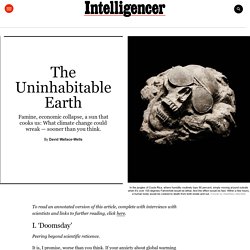
Peering beyond scientific reticence. It is, I promise, worse than you think. 16 Times Countries and Cities Have Banned Single-Use Plastics. We’re going to hit you with some plastic stats.
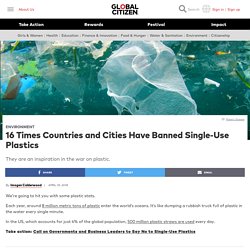
Each year, around 8 million metric tons of plastic enter the world’s oceans. It’s like dumping a rubbish truck full of plastic in the water every single minute. In the US, which accounts for just 4% of the global population, 500 million plastic straws are used every day. Take action: Call on Governments and Business Leaders to Say No to Single-Use Plastics. Aside from Damaging Our Health, Smoking Also Harms the Environment. The tobacco industry’s carbon footprint is greater than that of entire countries, such as Israel or Peru.

Tobacco’s disastrous effects on human health have been clear for decades, despite industry giants trying to hide the evidence linking cigarette smoke and disease for as long as possible. Despite Big Tobacco’s machinations, countless public awareness campaigns have exposed the drug’s role in causing lung cancer and numerous other serious conditions. Legislation around the world has slowly chipped away at the once-dominant addiction: Smoking prevalence has decreased by more than half in some developed countries since 1980 and continues to decline.
This progress has substantially contributed to cancer prevention efforts. Cost of cigarettes must rise to reflect environmental damage from tobacco industry, WHO says. The price of a packet of cigarettes should rise to reflect the wide-ranging environmental damage caused by the tobacco industry, from deforestation to water pollution, a major report has recommended.
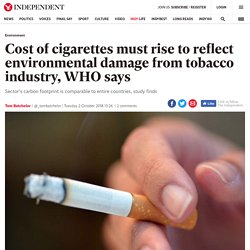
Backed by the World Health Organisation (WHO), the study found the industry’s carbon footprint was comparable to entire countries. Tobacco farms accounted for the loss of around 5 per cent of forests in parts of Asia and Africa, it stated. The UK was among the countries singled out for criticism along with several other western nations which were condemned for “literally burning poorer countries’ resources”. Tobacco control, a ‘major component’ of environmental protection efforts – UN health official. The World Health Organization Framework Convention on Tobacco Control (WHO FCTC), which is celebrating the 15th anniversary of it being adopted this year – is a global health treaty that advocates for the control of tobacco production, sale and use, as a way of reducing tobacco-related illnesses, deaths, environmental degradation and poverty across the world.
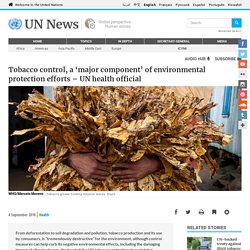
“People often immediately think of the health impact that tobacco has, but there is not enough awareness of how tremendously destructive it is for the environment too, on land, under water and in the air,” said Dr. Vera Luiza da Costa e Silva, the Head of the WHO FCTC Secretariat. “Studies indicate that tobacco growing could be up to 10 times more aggressive than all other deforestation factors,” Dr. da Costa e Silva noted.
Governments need to understand that tobacco control is a major component of any effective and holistic environmental protection effort - Dr. Vera Luiza da Costa e Silva, WHO FCTC Secretariat chief. Is inequality bad for the environment? That equality matters in terms of health and happiness has been clear for some years.
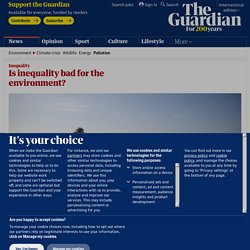
But it is also better for the environment. The evidence (which is still emerging) suggests the most unequal affluent countries contribute more to climate change via pollution than their more equal counterparts. A large section of their people may suffer more, too. A new report predicts the United States will see its levels of economic inequality increase due to the uneven geographical effects of climate change – resulting in “the largest transfer of wealth from the poor to the rich in the country’s history”, according the study’s lead author. In a 2016 report, Oxfam found that the greatest polluters of all were the most affluent 10% of US households: each emitted, on average, 50 tonnes of CO2 per household member per year. Who bears economic cost of env policy 2017.
Renewables 2019. Market analysis and forecast from 2019 to 2024 "Renewables are already the world's second largest source of electricity, but their deployment still needs to accelerate if we are to achieve long-term climate, air quality and energy access goals" Dr Fatih Birol, Executive Director, IEA Renewables 2019 is the IEA market analysis and forecast from 2019 to 2024 on renewable energy and technologies.
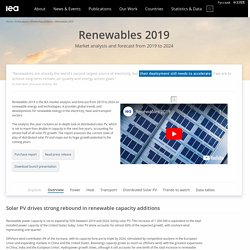
It provides global trends and developments for renewable energy in the electricity, heat and transport sectors. The analysis this year contains an in-depth look at distributed solar PV, which is set to more than double in capacity in the next five years, accounting for almost half of all solar PV growth. The report assesses the current state of play of distributed solar PV and maps out its huge growth potential in the coming years. UpcyclePop - Interactive Eco-Market- America's First Upcycle Market. Recycling of Polyvinyl Chloride. Polyvinyl chloride is one of the most widely used plastics worldwide.

A major problem in the recycling of polyvinyl chloride is the high chlorine content in raw PVC and high levels of hazardous additives added to the polymer to achieve the desired material quality. As a result, PVC requires separation from other plastics before mechanical recycling. PVC products have an average lifetime of 30 years, with some reaching 50 or more years. This means that more PVC products are reaching the end-of-life and entering the waste stream, and the amount is likely to increase significantly in the near future.
The destruction of the Earth is a crime. It should be prosecuted. Why do we wait until someone has passed away before we honour them?
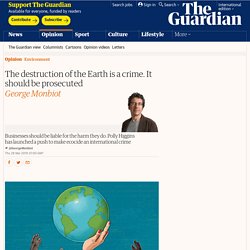
Sustainable Development Solutions Network. Price Less. Rewilding will make Britain a rainforest nation again. Chesapeake Bay Food Web. US military is a bigger polluter than as many as 140 countries – shrinking this war machine is a must. The US military’s carbon bootprint is enormous. Like corporate supply chains, it relies upon an extensive global network of container ships, trucks and cargo planes to supply its operations with everything from bombs to humanitarian aid and hydrocarbon fuels.
Our new study calculated the contribution of this vast infrastructure to climate change. Greenhouse gas emission accounting usually focuses on how much energy and fuel civilians use. But recent work, including our own, shows that the US military is one of the largest polluters in history, consuming more liquid fuels and emitting more climate-changing gases than most medium-sized countries. Have We Really Killed 60 Percent of Animals Since 1970? Ultimately, they found that from 1970 to 2014, the size of vertebrate populations has declined by 60 percent on average.
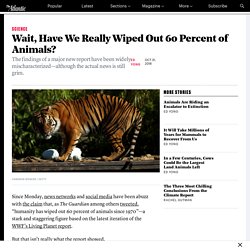
That is absolutely not the same as saying that humans have culled 60 percent of animals—a distinction that the report’s technical supplement explicitly states. “It is not a census of all wildlife but reports how wildlife populations have changed in size,” the authors write. Birds Are Vanishing From North America. The skies are emptying out. The number of birds in the United States and Canada has fallen by 29 percent since 1970, scientists reported on Thursday. There are 2.9 billion fewer birds taking wing now than there were 50 years ago. The analysis, published in the journal Science, is the most exhaustive and ambitious attempt yet to learn what is happening to avian populations. The results have shocked researchers and conservation organizations.
In a statement on Thursday, David Yarnold, president and chief executive of the National Audubon Society, called the findings “a full-blown crisis.” "I am 15. I’m blocking your commute so my generation has jobs to go to, and a planet to live on." Breaching a “carbon threshold” could lead to mass extinction. In the brain, when neurons fire off electrical signals to their neighbors, this happens through an “all-or-none” response. The signal only happens once conditions in the cell breach a certain threshold.
Now an MIT researcher has observed a similar phenomenon in a completely different system: Earth’s carbon cycle. Daniel Rothman, professor of geophysics and co-director of the Lorenz Center in MIT’s Department of Earth, Atmospheric and Planetary Sciences, has found that when the rate at which carbon dioxide enters the oceans pushes past a certain threshold — whether as the result of a sudden burst or a slow, steady influx — the Earth may respond with a runaway cascade of chemical feedbacks, leading to extreme ocean acidification that dramatically amplifies the effects of the original trigger. But Rothman says that’s not the case. What does this all have to do with our modern-day climate? Robbie Andrew: Professional home page.
‘Extraordinary thinning’ of ice sheets revealed deep inside Antarctica. Scientists shocked by Arctic permafrost thawing 70 years sooner than predicted. The Greenland ice sheet is melting unusually fast. 1.9 billion people at risk from mountain water shortages, study shows. A quarter of the world’s population are at risk of water supply problems as mountain glaciers, snow-packs and alpine lakes are run down by global heating and rising demand, according to an international study.
BOOK Life without plastic : the practical step-by-step guide to avoiding plastic to keep your family and the planet healthy. 20,000 scientists give dire warning about the future in 'letter to humanity' – and the world is listening. OSCILLATORIUM. World Forum for Acoustic Ecology. Organics. Planted Projects. Systemic. Stormy Weather. WEATHER. WorldWide. Edgy. Escapades. Percolate. Individuation. US.A.ID. More or less. Environment.